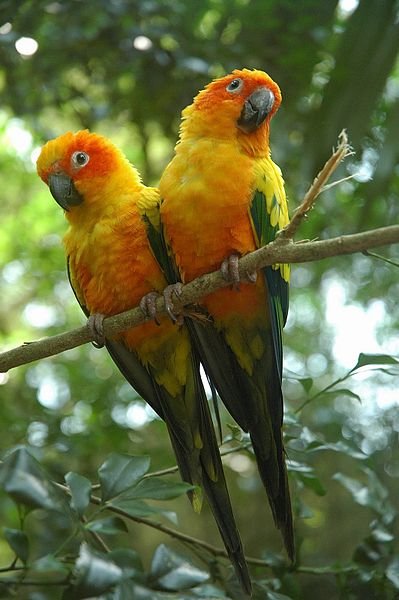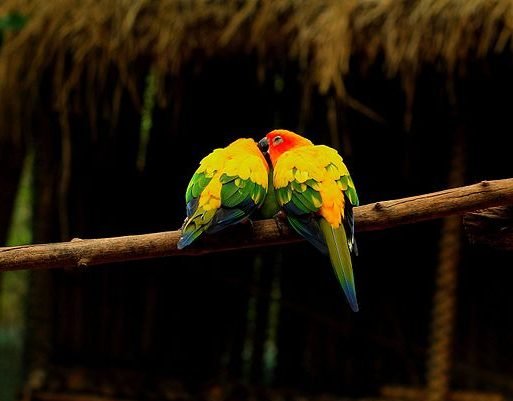Having a pet parrot, especially from the conure family, can sometimes be overwhelming for the new conure owners. How to determine sun conure gender accurately? And what if one was confident about both his conures to be males but then suddenly one of them happens to lay an egg. To steer clear of all these confusions or more so, to generally sex your bird for the naming ceremony, knowing the bird’s gender beforehand is advisable.
Sun Conure Gender Testing – The Wrong Way
Sun conures, like few other parrot species, are monomorphic meaning both the male and female are similar-looking and can not be told apart just by looking at them. They have no special colorings or markings like the dimorphic species for gender identification.
Therefore, many owners are told some hit-and-trial kind of methods to determine the gender of their sun. Let’s know all the wrong ways for knowing the sun conure’s gender to separate them from the right ones. Before we learn right way to do it.
Who hatches the egg
Sun conures are naturally inclined to sit on an egg to hatch the young ones. Many owners think that only females sit on the eggs but this is untrue. Male and female sun conures might take turns to sit on the egg. Hence, if one is taking the egg-hatcher as the female sun, i is not the right way of gender determination.
Territorial nature
Birds can be sometimes territorial and that holds for the sun conures too. And unlike some other parrot species, the female sun conure isn’t the territorial ones. Rather a male sun conure is very territorial and can get quite aggressive while sharing his cage with others. And cage is not the only thing he is possessive about. The male sun conure also doesn’t like sharing his favorite human companion either.
Quieter Sex
When one thinks of conures, one of their striking behavior stands out and that is their noise level. The whole conure species including the suns are so loud that they are detested by apartment dwellers. But many owners claim that out of the male and female sun conures, the females tend to be much quieter than their male counterparts. That said, this is not a sure-shot way of telling the sun’s gender accurately.
Physique
It is said that male sun conures have larger and sturdier physiques than the opposite sex who happens to be petite and soft. But there is no guarantee of it being always the case.
Beaks
The beaks of the male suns are, supposedly, large as compared to the female suns, as claimed by some experts. Again the method lacks any reliability.
The shape of the head
Many people specify the shape of male and female sun conures to be of a particular shape which, according to them, remains consistent. The shape of the male sun is more prominent with defined angles against the female’s that is a bit circular and lacks prominence when seen from the top.
Size of tails
It is believed that the tails of male sun conures almost always grow larger than the female sun. Factually, the size range of their tails has been recorded from 5.15 to 5.74 inches as against female sun’s tails that are said to grow only until 4.76 inches. But going by the statistics, many female suns can be found with their tails growing up to 5.74 inches too. So, that makes these criteria redundant.
Sun Conure Gender Testing -The Right Way
Since all the above methods lack the accuracy to tell apart a male sun from a female, there is a need to adopt a more drastic approach of sexing a conure accurately. Following are the sure-shot ways of knowing the gender of the pet Conure the right way.
Egg-laying
To answer the most famous question of sun owners of ‘how to know sun conure gender’, this is the easiest way of finding out if a sun conure is a male or a female and for the most of the sun owners, the preferred one too. If the bird lays an egg, he is not a ‘he’. The conure one might be thinking to be a male all the while, was a female.
Read more about Sun Conure Breeding:
https://parrotquaker.com/sun-conure-breeding/
But to know if a conure lays an egg or not, one has to wait until the bird attains sexual maturity, i.e., an age where she starts experiencing hormonal changes. An important thing to be noted here which tends to be ignored by most of the owners is that a female sun conure doesn’t always need a mate to lay eggs. More often than not, a female sun conure living alone in a cage yet laying an egg becomes a matter of disbelief for many sun owners, especially the new ones.
A female sun conure can certainly lay an egg without the help of a mate, though the egg will surely be infertile. And if the bird keeps laying on these eggs, she might get deficient in calcium, which in turn, paves way for many diseases. Hence, it is important for the owner to not let her single sun conure female lay any eggs in the first place.
To be able to do so, it is better off getting the bird’s gender checked as soon as he turns 6 months old as this is the minimum age where probably a bird might attain sexual maturity. Though most of them mature around 2 years or so. Therefore, it is better to rely on science and get the bird checked to keep him protected.
Surgical Sexing
Surgical sexing is a more scientific answer to the question of ‘how to check sun conure gender’. Performed by a certified avian veterinary, sexing a sun conure is the most proper method of determining the gender of the bird accurately. The bird is treated with mild anesthesia before plucking a few feathers to make a small incision in his abdomen. An arthroscope is then inserted through the incision to look for the pair of testes, proving the conure a male, or a single ovary, confirming the bird a female.
Though this method of gender determination carries the highest accuracy rate, it is avoided by most of the sun owners for the risks involved in the procedure. The procedure, unless extremely necessary to perform, is avoided by one and all due to the stress, both physical and mental, it causes to the bird. The risk of anesthetizing the bird and contracting infection post-surgical invasion are the two risks that pose a great danger to the bird’s life and well-being.
And this is the reason that the majority of the sun owners opt for DNA testing procedures if they are determined to know the gender of their bird.
DNA Testing
One of the more common ways of knowing sun conure’s gender is DNA testing for it being relatively safer than surgical sexing. And the accuracy equals any other proven sexing procedure.
The procedure works just like it does in humans. The avian vet performing the test will take out a blood sample of the bird either by clipping bird’s toenail or such other means. The DNA testing on that blood sample in the laboratory, thereby, clears the confusion around the gender of the bird.
One the clinic that does tasting you can even order parrot gender a testing kit from them: https://vetdnacenter.com/dna-tests/avian-dna-testing/
We are not affiliated with them, they are just one of the options, you can search online for the one that is closer to your home, and does shipping to your place.
Surgical Sexing vs DNA Testing
If the owner is confused between choosing between the two gender determination methods, here’s the direct comparison:
- Surgical sexing is invasive whereas DNA testing is not.
- Surgical sexing involves the use of anesthesia which is not the case while carrying out DNA testing.
- Surgical sexing can be quite painful for the bird whereas DNA testing is less bothersome.
- Post-surgical infection is the greatest risk in surgical sexing, unlike DNA testing where no such infection is possible.
- Both surgical sexing and DNA testing carry equal degrees of accuracy while determining sun conure gender differences.
Summing Up
Unless one isn’t bothered about adding to the flock of his existing sun conures, knowing the gender of the bird which might cause discomfort to him in the procedure, must be avoided. And while doing so, being protective and thoughtful about the possible risks involved in a certain procedure must be looked into for the safety of the bird.
Also, any medical sexing procedure must not be performed by anyone other than a certified avian expert. As he knows the best way to safely sex a bird and care for him in case the procedure goes awry.
Read How to improve the quality of Sun Conure Life & His lifespan:
https://parrotquaker.com/4-ways-to-improve-your-sun-conure-lifespan/




